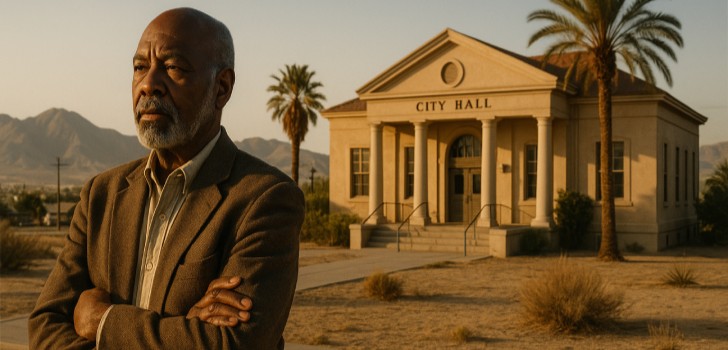
Busby Reflects on His Journey as Victorville’s First Black Mayor
Part one of an in-depth, raw look at the man who made the history books for Black Americans
The High Desert has had many first over the years. The age-old cliché, “that’s going to put [insert High Desert city here] on the map” has never gone away. Many locals feel it’s a lost region when one looks at the state of California as a whole. And there may be some truth to that, however, when one looks in history, they might find some things of significance or importance.
Busby was born just outside the downtown portion of Houston, Texas in the fourth ward. He’s the oldest of eight children born during the days of the Jim Crow laws, and the racial caste system which operated in southern states between 1877 and the mid-1960s.
Busby was 12 years old when his father died. His mother, Laydonia, had to raise eight children as a single parent with the youngest child being one month old. “I was taught at age 12 that I had to become the man of the house and began working with a family friend, Bill McFarland who was White a man,” says Busby who delivered the Houston Post newspaper at 3:00 AM in the mornings, seven days a week in the River Oaks exclusive section of Houston, Texas until he joined the Navy after one year of college (Texas Southern University) at the age of 18.
Like other young Black men, Busby had to navigate the Houston drug scene, the unfair criminal justice system, racism, and gangs. He even attended segregated schools.
“My mom taught me at a very early age that voting was essential for the success of the Black people. This was during the time of poll taxes and Jim Crow laws. Poll taxes were taxes whereby an individual had to pay to vote, for example, my mother had to pay $0.75 just to vote. I recall an incident when I was about six years old and my mother took me to a voting place and she asked the poll worker if I could go inside of the voting area with her. The poll worker in charge said, ‘there isn’t no way that we want to teach these n*****s how to vote.’ My mother said to me, ‘that’s okay son, you can see that they don’t want us to vote, so make sure that when you get old enough to vote that you never miss an opportunity to cast your vote,’ and to this day I never missed an opportunity to vote,” recollects Busby.
The former Victorville mayor says it became abundantly clear that voting would be the key to Black people gaining equal rights and that it was also during that time that he realized that one day he would seek an elected office to make sure that all people had an opportunity to let their voices be heard.
“It was many years later that I chose Victorville, California to seek elected office and the rest is history,” says Busby.
For Black History Month, Busby sat down for an interview about life as mayor and his current world views as they pertain to the local level of government:
Thanks, James for sitting down to do this. I’m told that you were the first Black mayor for Victorville. But you ran not one, not twice but three times for council and was appointed Mayor. Looking back all these years later, how does that make you feel about your time in public service?
I truly enjoyed my life as a public servant, the citizens of Victorville welcomed me with open arms showing me lots of love and appreciation. I tried to return that love by working for the betterment of the people every day that I was in office.
The 90s I’m sure was a completely different time in the High Desert for politics. What were some of the biggest issues you and your council had to face in those days?
I was elected in 1988. As a newcomer to the Victorville City Council, with ideas as to ways that we could improve our city, I found myself stunned by an announcement from the United States government that George Air Force Base was announced for closure. As Mayor of Victorville, not only was I concerned about the impact that the closure of George AFB would have on our local economy, Norton AFB was also announced for closure that same day. It just so happened that I was an employee of TRW’s Ballistics Division located at Norton, AFB in San Bernardino, California.
Busby went on in great detail about that moment in time as the leader of Victorville. He says his council and all other Victor Valley councils as well as the district supervisor for the area all came together in an unprecedented and united effort to encourage the government not to close the base, and second to develop a plan to reutilize the base if it was indeed closed.
Busby recollects that then-Congressman Jerry Lewis and county officials tried their hardest to save the base.
